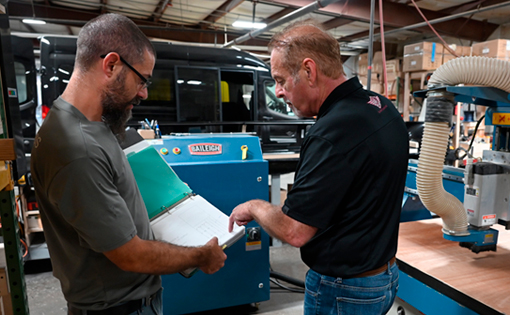
Cover Story: L.A. West Stays Ahead by Smashing Its Own Records
- Details
BY SUSAN ROSE
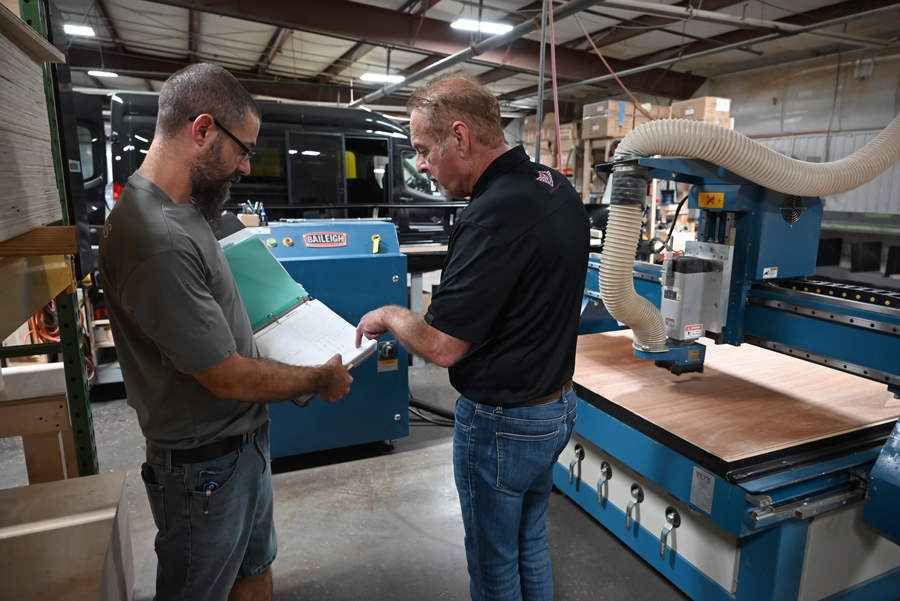 CNC Operator Jordan Willsey (left) discussing files with President & CEO Vern Kauffman Why does the Mercedes-Benz Sprinter continue to reign as the go-to vehicle in the chauffeured transportation industry more than a decade after its US debut? Vehicle fads have come and gone, but L.A. West President & CEO Vern Kauffman thinks he knows why the Sprinter endures. “Many operators have told us that if they don’t have the Mercedes badge then customers are maybe less receptive to hiring their transportation service. Customers have that expectation,” he says.
CNC Operator Jordan Willsey (left) discussing files with President & CEO Vern Kauffman Why does the Mercedes-Benz Sprinter continue to reign as the go-to vehicle in the chauffeured transportation industry more than a decade after its US debut? Vehicle fads have come and gone, but L.A. West President & CEO Vern Kauffman thinks he knows why the Sprinter endures. “Many operators have told us that if they don’t have the Mercedes badge then customers are maybe less receptive to hiring their transportation service. Customers have that expectation,” he says.
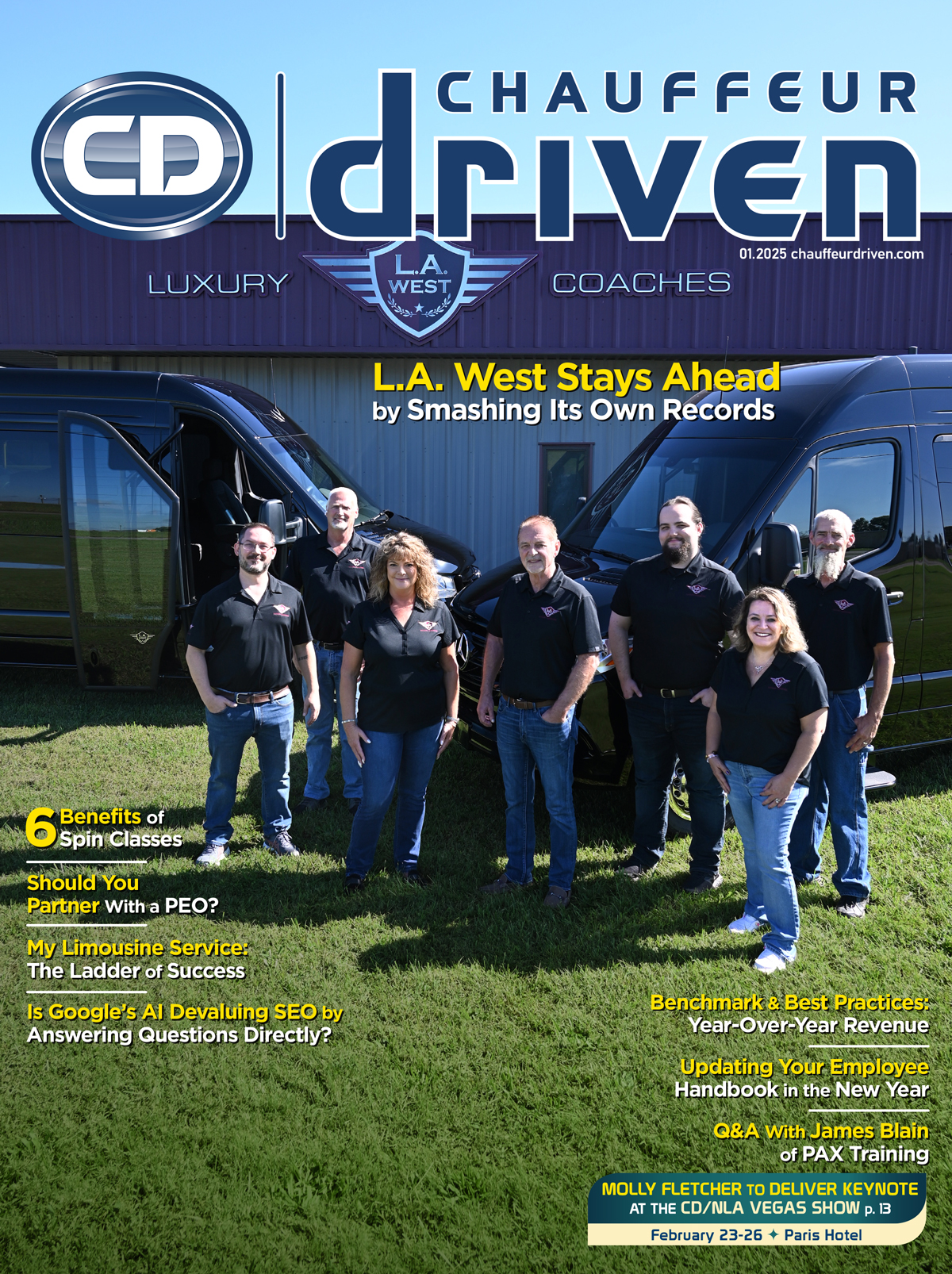 Cover Art: L.A. West President & CEO Vern Kauffman (center) and Director of Operations Michelle Keck (to his left) with the executive team at their North Carolina headquarters. Photography by Chris Weiss. For many looking to book service, the vehicle still does matter, especially when it comes to moving groups. At second-stage builder L.A. West, that means that their 14-passenger Sprinter with a European-style portal door continues to be in high demand. In fact, the best-seller has helped the eXpert Upfitter beat its top year on record again—for the third year in a row. Their second best-selling Ford Transit certainly holds its own, but the Sprinter is by far the company’s bread and butter.
Cover Art: L.A. West President & CEO Vern Kauffman (center) and Director of Operations Michelle Keck (to his left) with the executive team at their North Carolina headquarters. Photography by Chris Weiss. For many looking to book service, the vehicle still does matter, especially when it comes to moving groups. At second-stage builder L.A. West, that means that their 14-passenger Sprinter with a European-style portal door continues to be in high demand. In fact, the best-seller has helped the eXpert Upfitter beat its top year on record again—for the third year in a row. Their second best-selling Ford Transit certainly holds its own, but the Sprinter is by far the company’s bread and butter.
“We as a company are experiencing a record year in terms of topline revenue and total units produced and sold—topping 2022 and 2023. We’re up almost 10 percent over last year,” says Kauffman about their 2024 sales. “Part of our success is due to our loyal end-users. These are folks who started out buying one or two vehicles but now own close to double-digit L.A. West Sprinters and/or Transits in their fleets.”
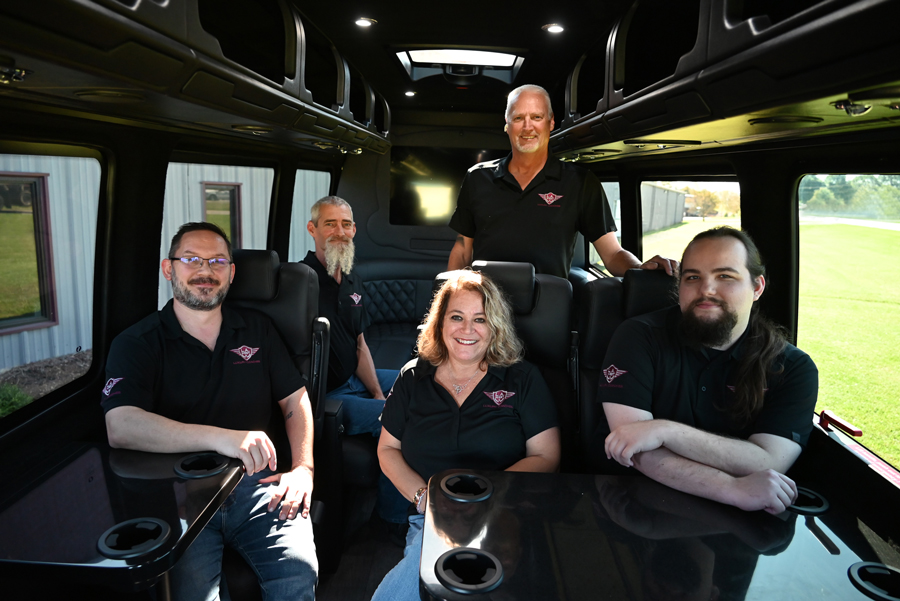 L to R: Michael Allen, Mark Birch, Todd Birch, Stephanie Hoyle, and Avery Childers in one of their Sprinters Having the industry’s hottest vehicle is a big part of the equation, but equally important is the company that stands behind the build. Thanks to their unique features, like their European-style portal door, stylish designs, and expansive, coast-to-coast dealer network, L.A. West is among the industry’s top brands. Their products, which regularly grace the pages of Chauffeur Driven, have certainly been a hit among their customers.
L to R: Michael Allen, Mark Birch, Todd Birch, Stephanie Hoyle, and Avery Childers in one of their Sprinters Having the industry’s hottest vehicle is a big part of the equation, but equally important is the company that stands behind the build. Thanks to their unique features, like their European-style portal door, stylish designs, and expansive, coast-to-coast dealer network, L.A. West is among the industry’s top brands. Their products, which regularly grace the pages of Chauffeur Driven, have certainly been a hit among their customers.
Although L.A. West, which is based in North Carolina, distributes its products primarily through its nationwide dealer network, Kauffman and his crew get plenty of facetime with customers, new and old, at the CD/NLA Shows in the spring and fall—where many operators were first introduced to their vehicles in person. This helps keep L.A. West in touch with industry demands—and trailblaze new trends of their own.
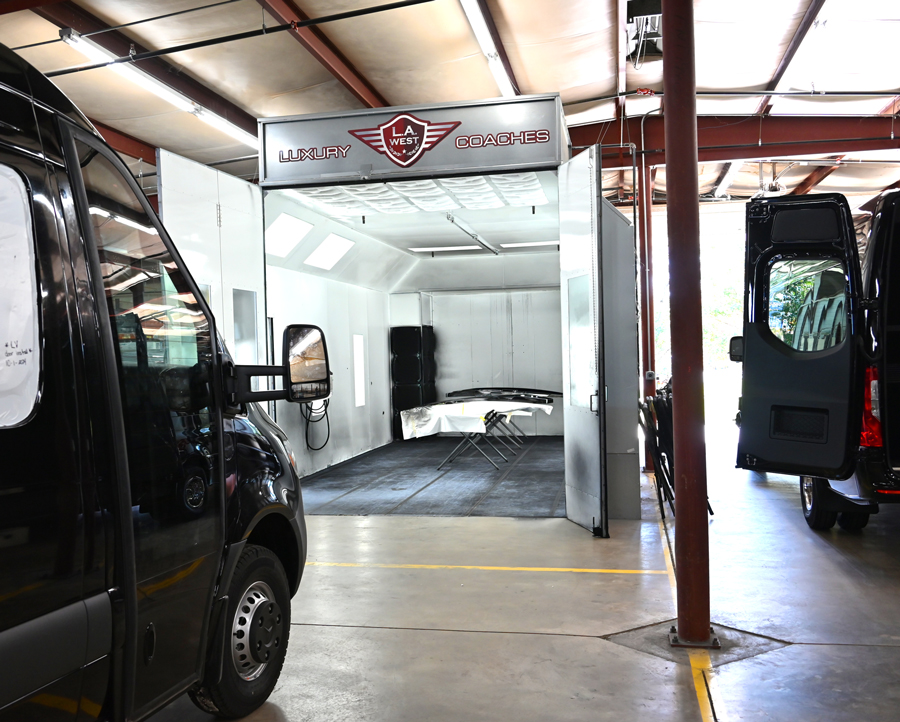 L.A. West’s new in-house paint booth Right now, the look that Kauffman says is most in demand is monochromatic—a change from the flashy chrome accents of recent popularity. The black with chocolate contrast or full cinnamon seats—two hot color palettes in the late teens—have been replaced with European-style seating and silver stitching.
L.A. West’s new in-house paint booth Right now, the look that Kauffman says is most in demand is monochromatic—a change from the flashy chrome accents of recent popularity. The black with chocolate contrast or full cinnamon seats—two hot color palettes in the late teens—have been replaced with European-style seating and silver stitching.
“Color and trim are where we’ve seen the most movement—seats, colors, and textures,” he says. “We’re definitely seeing a trend toward a monochromatic exterior like painted fascia, body moldings, and grills—customers want that sleek, European style.”
Being a part of the eXpert Upfitter program ensures that companies like L.A. West are held to rigorous safety and quality standards, while giving modifiers plenty of space to be creative for their end-users. L.A. West products come with a 3-year/36,000-mile warranty and can be conveniently serviced at OEM commercial dealers across the country, but more importantly, have the full backing of Mercedes-Benz.
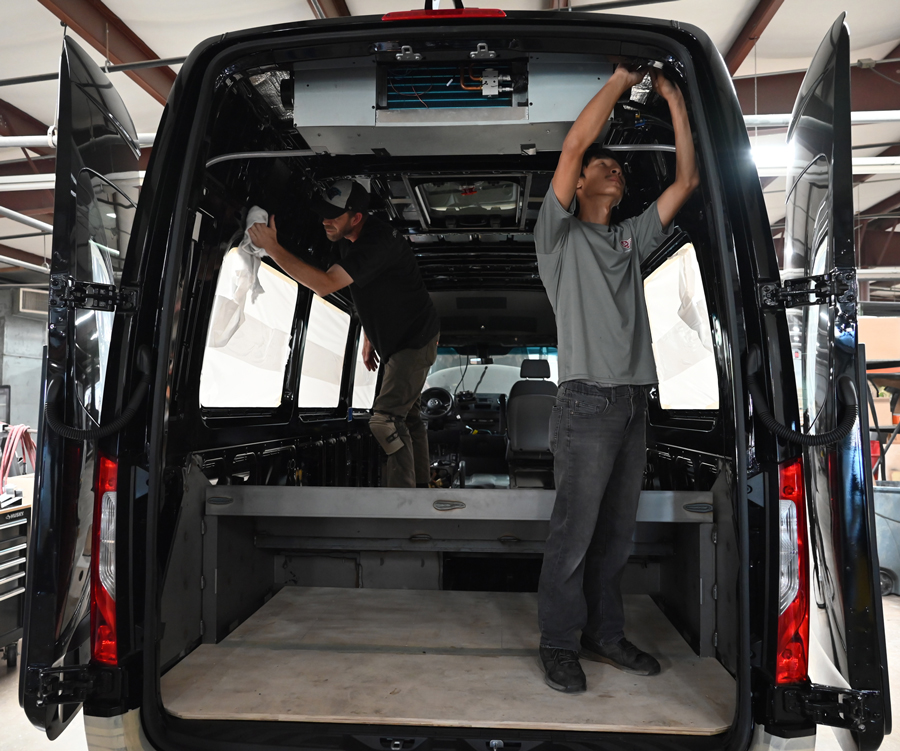 The wiring installation team “Our focus at L.A. West is all about the details,” says Kauffman. “We take great pride in being an eXpert Upfitter with Mercedes, and we were recently approved and extended for 2025-2026 as a continuation of our Upfitter status.”
The wiring installation team “Our focus at L.A. West is all about the details,” says Kauffman. “We take great pride in being an eXpert Upfitter with Mercedes, and we were recently approved and extended for 2025-2026 as a continuation of our Upfitter status.”
Director of Operations Michelle Keck agrees: “Mercedes-Benz’ program does it really well. They’re built to certain specifications and safety standards. I don’t know if the Sprinter will ever go away because I don’t know of another vehicle that is as appealing, and people like the badge.” Among the most recognizable names at L.A. West—beyond Kauffman himself, who has been in second-stage manufacturing for decades—are Keck and Vice President of Sales Kevin Kropf. They frequently join him at the shows and proudly display their popular lineup on the exhibit floor.
Kropf, who has years of experience in direct vehicle sales, has worked with Kauffman for more than a decade, and became a shareholder in L.A. West when the company acquired fellow builder McSweeney Designs in 2018, for which Kropf was a regional sales manager. His sales team includes David Marsh, who handles sales for the Eastern US for Mercedes-Benz dealers, and new addition Dan Clutterham, whose territory covers the Western half of the US.
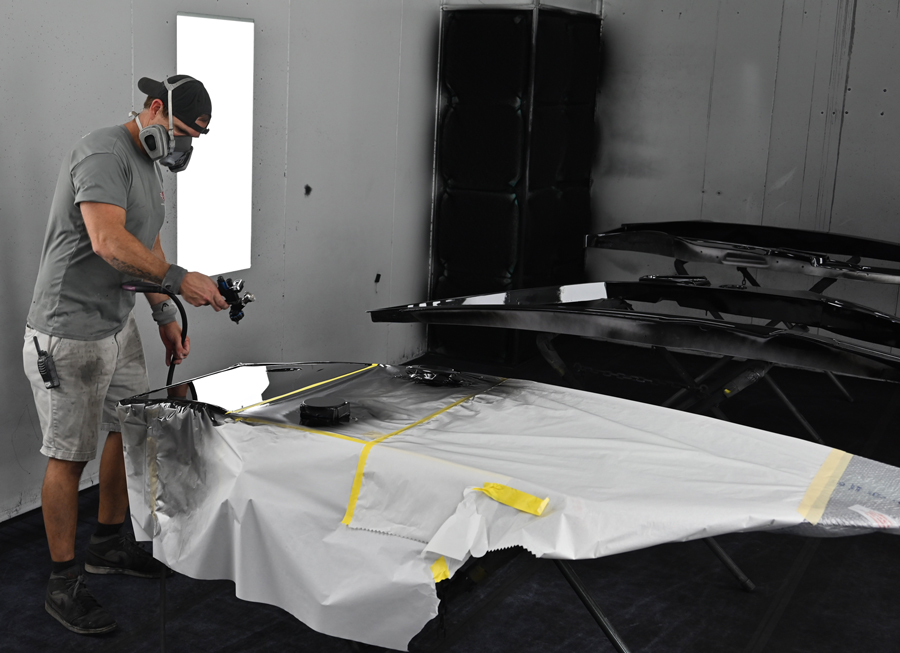 Paint Shop Manager Matt McVeigh oversees painting quality Now in her seventh year, Keck began her career with L.A. West in a part-time purchasing role, but Kauffman saw the gem he hired.
Paint Shop Manager Matt McVeigh oversees painting quality Now in her seventh year, Keck began her career with L.A. West in a part-time purchasing role, but Kauffman saw the gem he hired.
“When Michelle initially came on board, she was eager to learn and soak up information like a sponge. She very quickly was promoted and has been several more times in the years she’s been with us. She’s as much a face of the brand as Kevin or me. She touches literally every facet of the organization, whether it’s sales, marketing, production, purchasing, you name it. The way she has embraced additional responsibilities along the way makes her an extremely valuable part of the organization,” says Kauffman.
This year, L.A. West established their new in-house paint booth, which Keck says has not only reduced production time but has allowed them to increase their quality control.
“We’re very proud of our paint shop setup that we have,” adds Kauffman. “We have two very qualified painters in that department, and the biggest advantage it gives us is control over the quality of our products.”
 To stay ahead of the curve and ensure that they remain best in class, the L.A. West team continuously strives to be pioneering and cutting edge with their designs and production quality while respecting the tried-and-true processes that have made them such a respected brand in the industry. Whether it’s engineering, production, marketing, or sales, Kauffman says that frequent training and education are cornerstones of their company culture.
To stay ahead of the curve and ensure that they remain best in class, the L.A. West team continuously strives to be pioneering and cutting edge with their designs and production quality while respecting the tried-and-true processes that have made them such a respected brand in the industry. Whether it’s engineering, production, marketing, or sales, Kauffman says that frequent training and education are cornerstones of their company culture.
“There’s obviously a lot of moving parts within production and distribution, a lot of communication and coordination that takes place, but everyone is pulling the rope in the same direction,” he says about his team.
Behind the engineering team is Production Engineer Mark Birch, who was the first employee that Kauffman hired at L.A. West.
“I refer to Mark as our Einstein of L.A. West because there isn’t anything that he can’t figure out or find a solution for. We rely on him heavily,” says Keck. Birch’s brother, Todd, who joined the company two years ago, is also a rising star in the customer service and quality control team.
“We as a company are experiencing a record year in terms of topline revenue and total units produced and sold—topping 2022 and 2023.”
Production is overseen by Production Manager Michael Allen, who has been with L.A. West for more than five years. He began his tenure with the company as an electrician but was promoted to his current position several years ago.
“Michael has really impressed us with what he has managed to do with the challenges that he’s taken on,” says Keck, while Kauffman adds that he has blossomed into a great leader for their brand.
Another person you might recognize—or her voice, at least, when contacting the company—is Sales Coordinator/Receptionist Stephanie Hoyle, who joined the team last year. More than just a friendly soul on the other end of the line, Keck says that Hoyle has also taken on new tasks to expand her role.
“She’s a multitasker and an adept-at-handling-a-lot-of-things-all-at-once kind of person,” she says.
With the CD/NLA Vegas Show just months away, Kauffman says that the team—as usual—is working on product modifications that will intrigue the industry, and maybe even turn some heads.
“Yes, we’re always looking to raise the bar. We make it increasingly difficult after three record years, but it’s a challenge we fully embrace,” he says. “We do have some new things that we will be rolling out at the show in Vegas in February that people haven’t seen before, so stay tuned and come by the L.A. West booth #160 to see the debut.” [CD0125]

